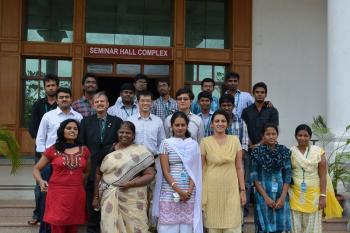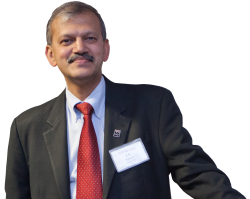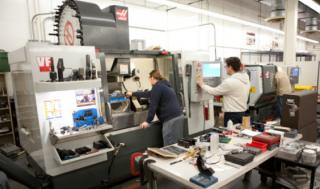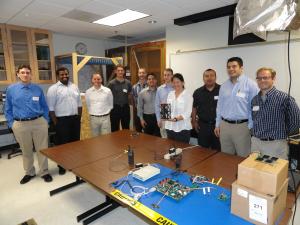Conferences: Assistive technology goes international…again
 It’s been 28 years since the first International Technology and Persons with Disabilities Conference (or CSUN Conference, as it is informally known). Since then the annual gathering has become the largest and best-known conference of its kind; it has also begun spawning spinoffs abroad. In 2012, for example, C.T. Lin, professor of mechanical engineering, and CECS dean S.K. Ramesh traveled to Linz, Austria, for the International Conference on Computers Helping People with Special Needs (ICCHP), which was inspired by the CSUN Conference and has been running every two years for approximately a decade.
It’s been 28 years since the first International Technology and Persons with Disabilities Conference (or CSUN Conference, as it is informally known). Since then the annual gathering has become the largest and best-known conference of its kind; it has also begun spawning spinoffs abroad. In 2012, for example, C.T. Lin, professor of mechanical engineering, and CECS dean S.K. Ramesh traveled to Linz, Austria, for the International Conference on Computers Helping People with Special Needs (ICCHP), which was inspired by the CSUN Conference and has been running every two years for approximately a decade.
Because of the college’s leadership in assistive technology engineering, Ramesh and Lin have become sought-after speakers in the field. Last summer, they were invited to a new conference in India: Intelligent Interactive Systems and Assistive Technologies (IISAT), cosponsored by the IEEE, CSUN and the Kumaraguru College of Technology (KCT). Held August 1 through 3 at KCT, it brought together approximately 100 researchers, students, developers, engineers, managers and decision makers from government, academia and industry to share the latest advances in intelligent systems and automation, controls and communications technologies, with an eye toward applying them to help people with special needs.
Lin and Ramesh gave a half-day workshop on the programs at CSUN, with Lin attending virtually from Northridge. “When they teach engineering in India, they think very traditionally—mechanical engineering, electrical engineering, civil engineering,” says Ramesh. “This conference opened up a whole set of possibilities—how you can use your engineering degree to help people.”
The conference also included the first-ever SS12 competition in Asia, which attracted approximately a dozen student teams from universities in India, Bangladesh, Pakistan, Sri Lanka, Japan and Australia, competing to develop software applications to serve people with disabilities. Modeled after the SS12 events in the U.S. and Europe, it was sponsored by Project Possibility, as the U.S. and European SS12 competitions are.
The IISAT conference was such a success that KCT has committed to build a center on its campus to promote assistive technology.
“The whole field is very nascent in India,” Ramesh explains. “It doesn’t exist. But there are a lot of people who need assistive technology, and KCT will be taking the lead.”
As further evidence of CSUN’s growing international influence in assistive technology, two faculty members from Korea Nazarene University (KNU) visited the university in July, along with 15 leaders in the field of rehabilitation in Korea and a councilwoman from the city of Cheonan. KNU specializes in assistive technology and rehabilitation engineering and was interested in exploring ways to strengthen the partnership between the two institutions, including opportunities to send KNU students to CSUN. A visiting KNU faculty member, Dr. Juhye Yook, was on campus for most of the year as well, working with Ben Mallard, professor of electrical and computer engineering, on augmentative and alternative communication.
A message from the Dean
February 6, 2014Industry partnerships – HAAS
February 6, 2014Industry Partnerships – Jet Propulsion Laboratory
February 6, 2014
Leave a reply Cancel reply
-
Welcome to the 2015-16 edition of Spectra
March 25, 2016 -
Giving: Alumnus and Professor gives back to students and faculty
January 20, 2021 -
Department News
November 21, 2011




